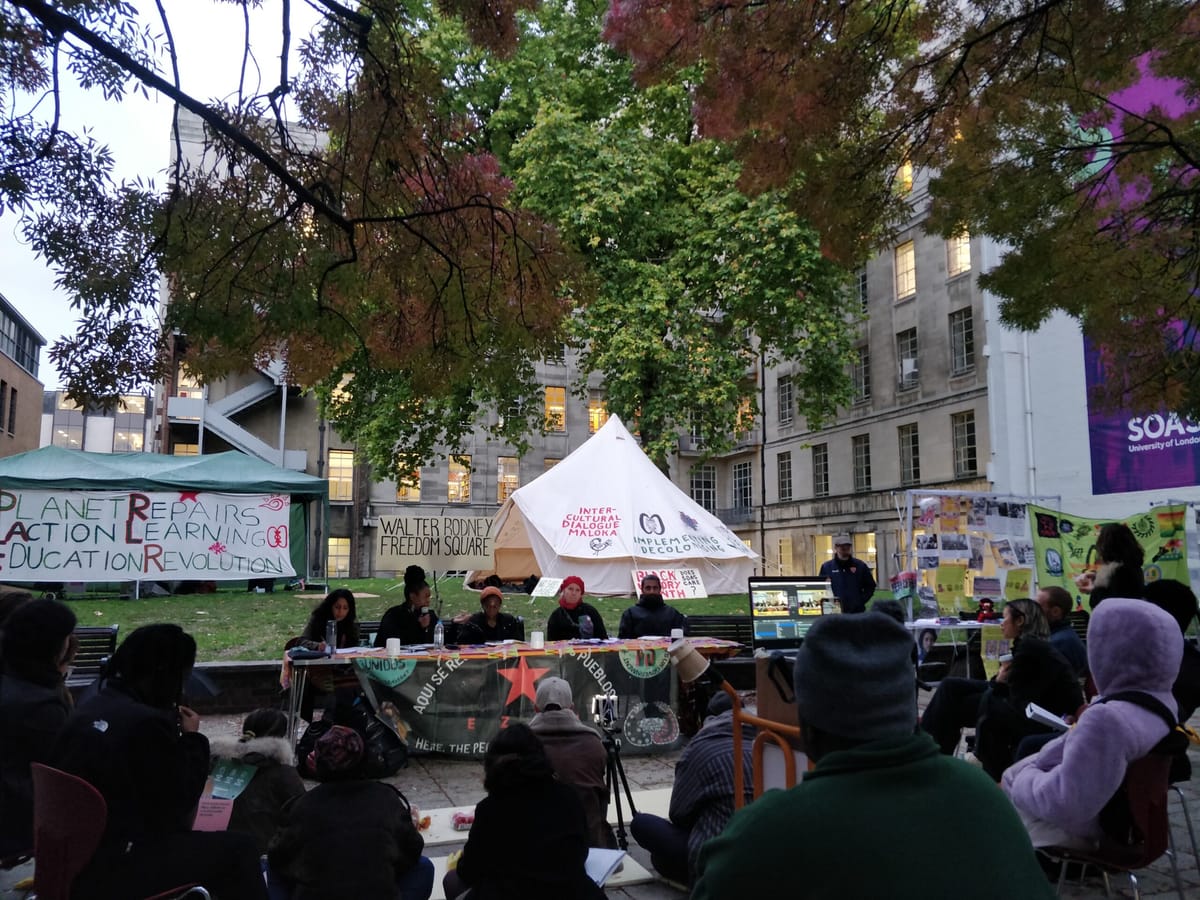Academic institution or a university for community solutions?

Daphne Saunders, BA second year Global Liberal Arts
Decolonial strugggles, inter-cultural dialogue, and social justice are all issues that have long been the common calling of Soasians, and what has brought ambitious free thinking students flooding through its doors from around the world. Yet many students say that the classroom has not fulfilled the promise that drew them in, whilst others still condemn SOAS as a colonial institute. Education at SOAS and beyond is falling short. On the week of Monday 12 October many students found their calling more directly addressed in an alternative education space on campus: PRALER.
“What do students really want from their studies, and what is the role of universities for glocal communities“
PRALER (planet repairs action learning educational revolution) is a student and alumnae led group addressing societal issues practically rather than in the abstract. They hold that the purpose of universities is to be in service of communities and the global majority. Raising the question of what do students really want from their studies, and what is the role of universities for glocal communities? In response, their declaration asserts ‘our peoples rights to an education capable of defending the best interests of our communities, especially a just peace.’
Led by this vision, the group transformed a square of campus from an otherwise unused patch of grass into a vibrant space where banners, student paintings, and informative expos, assembled animated voices in communal learning. They created a space that for one week materialized their vision of education, inaugurating it ‘Walter Rodney Freedom Square’. It centered community needs and voices as their drivers of learning, hosting conversations, brainstorms, panels, lectures and zoom calls with students, speakers, communities, and indigenous peoples around the world. Over a week of Black History month and across Indigenous Peoples resistance days, the group addresses the needs of these marginalized communities.
It became a space committed to emancipatory education where the abstract meets action and the ivory tower sits at street level. Law students could study property law in the classroom and then go downstairs to attend a zoom call with indigenous communities about their legal battles to retain land. For many this kind of ‘action learning’ was a revelation. ‘It shows you how your degree can actually be useful, it’s great’. One passing lecturer said enthusiastically ‘before it looked like nothing, now it looks like what a university is supposed to look like!’
Yet the question of what a university is supposed to look like remains very much contested. Wedged between the towering, opaque and heavily-guarded university buildings, Praler’s colorful marquees and expos perfectly illustrate the contrasting visions. Yes, they are very different, but must they be opposed? One organizer answered that ‘all knowledge has the right to coexist’. Yet the University of London’s management does not seem to agree, instead they used security guards to threaten immediate eviction. It is hard to see the need for hostility when PRALER could be in synergy with even those students who seek to use the university in a more traditional sense. So who is the university defending and is collaborative coexistence possible?
Addressing those students who would rather keep their head down and study, one organizer said ‘If that’s what you want to do, do your thing, but there are alternatives.’ Crucially it is these alternatives that those struggling to find meaning in their course are desperate for. Whilst others feel totally alienated from the education system as a whole and demand ‘cognitive justice’, that legitimizes non-eurocentric and practical ways of learning.
There are also many that are not only desperate for more meaningful education generally but enraged by their unmet expectations of Soas specifically. ‘It actually hurts. There’s a level of violence to what SOAS does.’ To these students the institute’s decolonial promise is criminal because it is profiting from verbally upholding glocal communities whilst in practice working to their detriment. If the university wants to be serious about its 2017 decolonising vision which promises to embed a decolonial approach in its ‘contribution as a public university in the service of the wider world.’, then it might collaborate with student initiatives to do just that.
Whilst PRALER’s week-long residency has expired, the group and its concept of action learning will not. Neither will the shortcomings about the nature of education it has shined a light on. The benefits, and some may say, imperative of ‘action learning’ that they claim, leads us to consider the wide potential for institutionalizing the concepts it uses.
One PRALER statement that might be cause for common-ground is, ‘We cannot have education that is training desk-killers’ Once upon a time this is exactly the alumnae that SOAS trained and sent around the world, today we must all make sure the university is empowering a very different alumnae to uphold glocal needs as PRALER demands. The group’s methods and vision of education may evoke varied opinions, but its goals do not.
Photo Caption: a gathering around the PRALER stand on SOAS green (credit: Daphne Saunders).



